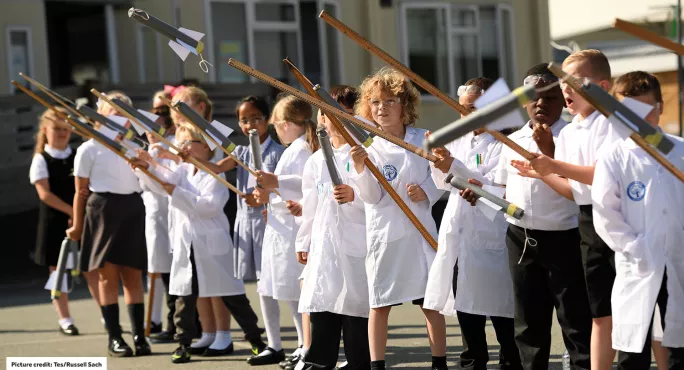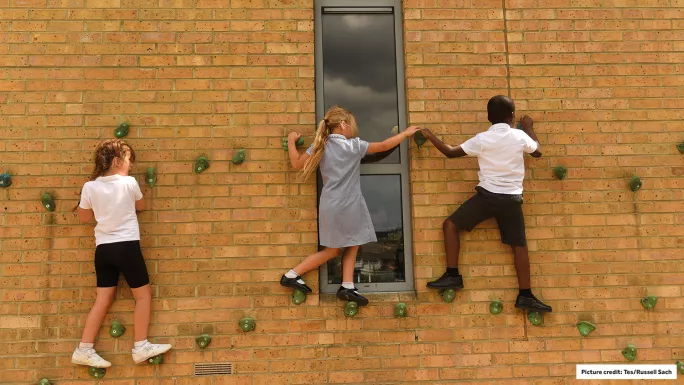- Home
- ‘Far beyond the traditional expectations of education’
‘Far beyond the traditional expectations of education’

It was sheeting down on Malcolm Drakes’ first day as headteacher at Broadford Primary.
The school in Romford, East London, was his first headship and he had already taken the unpopular decision to bar parents from breakfast club: “They were just using it as a social club, eating bacon sandwiches while their children ran amok.’
Now, he was at the gates in the rain facing an irate mother who said that her daughter would not be staying.
“Brooke’s mum told me the results were awful, the school was in special measures and she was going to leave as soon as she could get a place in another school,” says Drakes.
And he understood. When he joined in September 2011, the school was already in the process of moving into a new £4.5 million building. But when he had toured the old school during the application process, he found that the quadrangle - which should have been an early years garden - had been overgrown with brambles.
“I don’t think I had ever left anywhere more angry,” he says.

This year, Broadford won the overall school of the year prize at the Tes Schools Awards. It is a place that “goes far beyond the traditional expectations of education”, according to the awards’ judges.
The accolade followed a remarkable few years since Drakes’ arrival at the school. Broadford, where half of the pupils are or have been eligible for free school meals, rose rapidly out of special measures to be judged “outstanding” by Ofsted in 2014.
Last year, 81 per cent of pupils met the expected standards in reading, writing and maths, compared with 53 per cent nationally.
Many factors have contributed to the school’s turnaround - high expectations for pupils, systematic approaches to teaching and a professional development plan for all teachers - but having a clear moral purpose is top of the list for Drakes, now executive headteacher of both Broadford and nearby Mead Primary. “I had a vision from the moment I started,” he says. “I don’t want the socio-economic background of pupils to be a limit on their future life chances.”
And so, the school promises that every child will get a trip out each term. And each term a visitor, such as a theatre workshop, will come into the school. It gives pupils opportunities in music, sports and drama.
The school runs a “Broadford University” careers programme on Friday afternoons. And it brings the wow factor into lessons, too.
On the day that Tes visits, the school’s visiting reading dog, Theo, a grey-beige Weimaraner, is in the library being read to by three children. Meanwhile, Year 3 are busy setting fire to wire wool in a science lesson, Year 5 boys are toasting marshmallows around the school’s firepit and the infants are taking part in their sports day.
Despite the varied activities on offer, the atmosphere in the school is not frenetic but one in which there is plenty of space and time for everyone to try new things, perhaps to make mistakes, but to learn and to succeed.
And giving children the opportunity to try new things, supporting them to stand up and speak out, has had impressive results. Not just in the traditional measure of Sats scores, but in fostering confidence and independence.
Leo Mbata and Temira Hasca, both in Year 6, addressed an audience of 12,000 people at the SSE Arena, Wembley, during the charity event WE Day last year.
Leo’s way to deal with nerves demonstrates the school’s influence on its youngsters. “When we went on the stage and told everyone about our random acts of kindness, I just pretended I was at school,” he says.
But for children to reach such heights in Year 6, they need a solid foundation.
Prioritising early years is key. “It is number one, without a doubt,” says Drakes. “If you don’t get it right in the early years, you are forever picking up the pieces. They have to leave Reception with good language and behaviour, and be on the way to reading and writing, with the ability to share and play with people and a love of coming to school.”
Adding some sparkle
The way reading is taught exemplifies the Broadford approach - systematic teaching, support for teachers and some sparkle for the children. Lois Nicholls arrived as deputy head in the summer of 2012 with responsibility for reading. She became headteacher of Broadford when Drakes was made executive head.
The school brought in a phonics programme for both beginner readers and struggling older pupils. Nicholls would visit the classrooms every week to support teachers, and children would be assessed every six weeks and offered daily one-to-one help. New members of staff have the full two-day training, rather than being told “this is what we do” by a colleague.
This focus on training teachers helped the school’s phonics check results to rise from 39 per cent in 2012 to 88 per cent in 2017. But, as Theo the reading dog shows, there is more to the school’s reading policy than phonics.
There are also book clubs and a reading league. The best team in the league - in which points are awarded for pages read - win a trip out at the end of term.
This level of activity is possible because management responsibilities are shared by seven full-time members of the senior leadership team working across Broadford and Mead. There is also a relatively high level of pupil-premium funding - and they are constantly searching for more funding opportunities.
The anger that drove Drakes is not so evident today. He stands on the playground, beneath a huge canopy, and fiddles with his phone. Suddenly there is music. The school has speakers everywhere. “Every morning in each class, I expect music to be on in the background; it’s on the checklist,” says Drakes.

If the school runs like clockwork, it is partly because of the 19 such checklists for teachers that help to set expectations. The early morning checklist, for example, has 12 points that teachers are expected to follow - in every class there should be music playing for a positive atmosphere, pupils putting their bags away and a creative starter activity on the board.
Pupils don’t have checklists, but they do have three rules: turn up on time every day, do their best in every lesson and be kind and polite to everyone they meet.
It was the Broadford pupils who persuaded Amelia Chau, head of Year 6, to stay in teaching. She joined the school in 2013, did two years under the Teach First scheme and then left for a management trainee position at Aldi.
“I felt at that time that I wanted to do something new,” Chau says. “I got a good pay rise and after four years I could have been on £80,000 a year, but I came back [to the school] after a term. Here, I understand why I come into work. Everyone gets on so well and the children are amazing.”
And as for Brooke, she is now in Year 4.
“I asked her mum to give me six months,” Drakes says. “After six months she withdrew her threat to take Brooke out - and she has sent her second child here as well.”
Keep reading for just £1 per month
You've reached your limit of free articles this month. Subscribe for £1 per month for three months and get:
- Unlimited access to all Tes magazine content
- Exclusive subscriber-only stories
- Award-winning email newsletters



